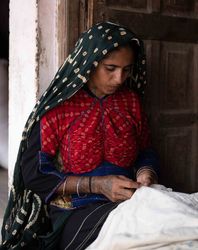Few designers excite me with their narratives of handspun, handwoven, handmade clothing more than the fashion label 11.11. For more than a decade, the designers behind the label, Himanshu Shani and Mia Morikawa, have been committed to giving everyday craftsmanship the respect of couture, propagating the idea that the use of indigenous cotton and natural dyes are the true hallmark of Indian luxury.
explained what sustainability meant to many of us. It is a label which believes that the foundation of fashion in India is our relationship with the artisan, a respect for our climate and local culture, and by extension, developing organic materials.
The designers depart from mainstream manufacturing to produce small batches of slowly-harvested and slowly-made clothing partnering with artisans, not employing them. Their jeans even have the weaver’s name embroidered in Devanagari script on its pocket, so you know who actually made it. They ensure their clothes come with a unique production code that traces back to each pair of hands that has produced it, right from the cotton farmer, to the spinner, weaver, dyer and tailor.
I will give them credit for introducing me to ‘kala’ cotton of Kutch, an indigenous variety that is grown without pesticides or fertilisers, and is fully rain harvested, hence takes time to cultivate. It produces a short-staple yarn, which means fewer twists per inch, and is in natural colours. Kala cotton is a resilient fibre that is produced in rough climates; it is thus strong and coarse. It is often used in denim but, like linen, can be used in everyday wear, too. After the 2001 earthquake in Kutch, the area experienced breakneck industrialisation that adversely impacted local livelihoods and culture. According to the Kutch weavers cooperative Khamir, the number of weavers has declined from 2,000 in the mid-1990s to a few hundred today.
The 11.11 label is also building an artisan colony in Kutch, where some 350 farmers, weavers, dyers, printers and tailors will live and work. It encourages and trains them to make modern products for contemporary use.
Part of this initiative is Kala Khoj, a child art project that took wings a few months ago. It uses artwork and drawings made by children of consumers, and creates high quality contemporary items like quilts, totes and jackets. Kala Khoj uses indigenous crafts of appliqué and quilting with kantha (the good-old running stitch). The memory of one’s child’s handiwork is maintained via a top-drawer keepsake.
Kala Khoj is a for-profit company that is co-owned by artisans based in the Khambra village of Kutch. Supported by the Goodearth Heritage Foundation, 11.11 aims to build an ecosystem where the process from a seed to a stitch nurtures local environment and livelihood. “Many brands come to India from Europe and the US to produce things cheaper, and not get the true value of craftsmanship,” Shani tells me. “I believe the true value is in indigenous craft practices of India. It is important to have many spaces like Kala Khoj, which are producer-owned and produce world-quality craftsmanship with a value. Made in India needs to make its own identity.”
It is a wonderful initiative where a designer label seeks to give back to its artisans a more sustainable and modern entrepreneurial way of living.
@namratazakaria


